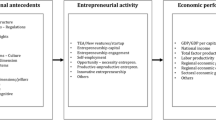Abstract
This article is an introduction to the special issue from the 4th Global Entrepreneurship Monitor Research Conference held at Imperial College Business School, London, in 2010. The article has two objectives. The first is to summarize the history of the GEM consortium, some of the contributions that it has delivered, and some challenges and opportunities ahead. The second is to present a summary of the papers in the context of the utility of GEM data in comparative entrepreneurship research.
Similar content being viewed by others
Notes
The original acronym was GOEI, or Global Opportunity and Entrepreneurship Index. The name Global Entrepreneurship Monitor, abbreviated as GEM, was proposed by Erkko Autio, who had just bought the gems for the engagement ring for his future wife.
References
Acs, Z. J., Autio, E., & Szerb, L. (2013a). National systems of entrepreneurship: Measurement issues and policy implications. Research Policy,. doi:10.2139/ssrn.2008160.
Acs, Z. J., Szerb, L., & Autio, E. (2013b). Global entrepreneurship and development index 2012. Cheltenham: Edward Elgar.
Autio, E. (2005). Global entrepreneurship monitor 2005 special report on high-expectation entrepreneurship. London: Global Entrepreneurship Research Association
Autio, E., & Acs, Z. J. (2010). Intellectual property protection and the formation of entrepreneurial growth aspirations. Strategic Entrepreneurship Journal, 4(3), 234–251.
Autio, E., & Fu, K. (2013). Economic and political institutions and entry into formal and informal entrepreneurship. Asia Pacific Journal of Management (in print).
Baumol, W. J. (1990). Entrepreneurship: Productive, unproductive and destructive. Journal of Political Economy, 98(5), 893–921.
Birch, D. (1987). Job generation in America. New York: The Free Press.
Bosma, N., & Levie, J. (2010). Global entrepreneurship monitor 2009 global report. London: Global Entrepreneurship Research Association.
Bosma, N., Wennekers, S., & Amoros, J. E. (2012). Global entrepreneurship monitor 2011 extended report: Entrepreneurs and entrepreneurial employees across the globe. London: Global Entrepreneurship Research Association.
Bowen, H. P., & De Clercq, D. (2008). Institutional context and the allocation of entrepreneurial effort. Journal of International Business Studies, 39(1), 1–21.
Coduras, A., Levie, J., Kelley, D., Saemundsson, R., & Schott, T. (2010). Global entrepreneurship monitor 2009 entrepreneurship education and training special report. London: Global Entrepreneurship Research Association.
Desai, S., Acs, Z. J., & Weitzel, U. (2013). A model of destructive entrepreneurship: Insight for conflict and postconflict recovery. Journal of Conflict Resolution, 57(1), 20–40.
Djankov, S., Glaeser, E., La Porta, R., Lopez-de-Silanes, F., & Shleifer, A. (2003). The new comparative economics. Journal of Comparative Economics, 31(4), 595–619.
Djankov, S., La Porta, R., Lopez-de-Silanes, F., & Shleifer, A. (2002). The regulation of entry. Quarterly Journal of Economics, 117(1), 453–517.
Estrin, S., Korosteleva, J., & Mickiewicz, T. (2012). Which institutions encourage entrepreneurial growth aspirations? Journal of Business Venturing, 28(4), 564–580.
Godfrey, P. C. (2011). Toward a theory of the informal economy. The Academy of Management Annals, 5(1), 231–277.
Levie, J., & Autio, E. (2011). Regulatory burden, rule of law, and entry of strategic entrepreneurs: An international panel study. Journal of Management Studies, 48(6), 1392–1419.
Minniti, M., Arenius, P., & Langowitz, N. (2005). Global entrepreneurship monitor 2004 report on women and entrepreneurship. London and Babson Park: London Business School and Babson College.
Peng, M. W. (2002). Towards an institution-based view of business strategy. Asia Pacific Journal of Management, 19(2/3), 251.
Reynolds, P. D. (2007). New firm creation in the United States: A PSED I overview. Foundations and Trends in Entrepreneurship, 3, 1–149.
Reynolds, P. D., Bosma, N., Autio, E., Hunt, S., De Bono, N., Servais, I., et al. (2005). Global entrepreneurship monitor: Data collection design and implementation: 1998–2003. Small Business Economics, 24, 205–231.
Reynolds, P. D., Camp, S. M., Bygrave, W. D., Auito, E., & Hay, M. (2001). Global entrepreneurship monitor executive report 2001. London and Babson Park MA: London Business School and Babson College.
Reynolds, P. D., Hay, M., & Camp, S. M. (1999). Global entrepreneurship monitor executive report 1999. London and Babson Park MA: London Business School and Babson College.
Reynolds, P. D., & White, S. B. (1997). The entrepreneurial process: Economic growth, women, and minorities. Westport: Greenwood Publishing Group Inc.
van Stel, A., Storey, D. J., & Thurik, R. (2007). The effect of business regulations on nascent and young business entrepreneurship. Small Business Economics, 28(2/3), 171–186.
Weitzel, U., Urbig, D., Desai, S., Sanders, M., & Acs, Z. (2010). The good, the bad, and the talented: Entrepreneurial talent and selfish behavior. Journal of Economic Behavior & Organization, 76(1), 64–81.
Author information
Authors and Affiliations
Corresponding author
Rights and permissions
About this article
Cite this article
Levie, J., Autio, E., Acs, Z. et al. Global entrepreneurship and institutions: an introduction. Small Bus Econ 42, 437–444 (2014). https://doi.org/10.1007/s11187-013-9516-6
Accepted:
Published:
Issue Date:
DOI: https://doi.org/10.1007/s11187-013-9516-6




